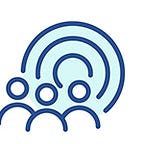A Loup Case Study: eCampus Ontario
Highlighting innovation and collaboration in Ontario’s post-secondary institutions.
Many organizations struggle to tell a crisp, compelling story about what they do. Too often, impact is measured through the narrow lens of quantitative data — a rote exercise that often ends up generating yet another report. At Loup, we help mission-driven organizations push through the tyranny of numbers to put a human face on their work and better understand why and how change is happening. Helping stakeholders, clients, customers, and staff articulate their stories serves organizations — as well as those who fund their work.
eCampus Ontario works to boost access to post-secondary education and training. A nonprofit funded by the Ontario government with 45 member institutions, the organization functions as a center of excellence in technology-enabled learning for all publicly-funded colleges and universities in the province. It supports the research, development, and the sharing of exemplary practices in online learning.
Beginning in October 2018, Loup partnered with eCampus to document some of their top projects with the aim of exploring their successes through a lens that aligned with the provincial government’s priorities: affordability, efficiency, productivity, and positive economic impact. Together, we decided to develop a set of stories that:
- Profiled a range of educational institutions
- Included both French and English projects
- Created narrative-based content for an eCampus website refresh and social media
- Highlighted the innovative Open Educational Resources (OER) that were being developed by each of the projects
- Helped teams with their noses to the grindstone recognize the truly impressive work they were conducting
At Loup, we take an iterative approach to our work and are committed to constantly learning and improving — even within the space of a single project. With that in mind, we decided to begin by profiling Nancy Purdy and Patrick Neumann, a collaborative team from Ryerson University. The pair built an innovative curriculum featuring an online game to train nurses in planning and leading process improvements in their workplaces.
Using our StoryEngine methodology, we conducted an in-depth interview with Patrick and Nancy to learn more about their work, including the challenges and opportunities they face within the open education environment. This rich conversation yielded so many insights that we had to adjust our process mid-stream to ensure their observations we properly highlighted.
Our adaptation: We decided to develop a Story Kit to share key quotes from their interview in multiple formats, including a blog, social media content for multiple platforms, and an audiogram. We packaged these elements together, ensuring that all content was open and editable so everyone on the project team — eCampus Ontario as well as Patrick and Nancy — could use and remix it however they needed. Realizing that a packaged Story Kit is a strong way to turn an in-depth interview into remixable content to shine across various platforms, we proceeded with three additional project teams.
Our second interview featured the eLearning Developer program, a bilingual project jointly developed by Durham College and Collège La Cité. Our discussion involved five participants connecting from multiple locations. We had some reservations about how successful this would be — technical challenges and poor internet connectivity on anyone’s part can sometimes derail a group conversation. But luckily the connections were good and all of the participants were not only well-prepared, but also excellent at sharing space so that everyone could contribute to the conversation.
Our final two interviews featured Linda Crosby and Donna Sevenpifer explaining their access to healthcare project, Digital Inclusion of Marginalized Seniors, and the professor/student combination of Dr. Catherine Anderson and Mariam Behket, discussing the course Essentials of Linguistics, which utilizes digital OER content from around the web.
eCampus Ontario used these interviews and related assets in a number of ways, from rolling them out on their website and blog over several months to highlighting each project via social media. Loup also shared these communication assets widely throughout our networks — posting on Twitter, Instagram, Facebook, LinkedIn, Medium, and our own StoryEngine website. We also shared the text and images of our posts back to the project leads so they could reuse and remix them however they wanted.
As a result, not only did the visibility of each individual project increase, but the sharing and re-posting on social media drew broader attention to the eCampus program in the open learning community.
From this experience, Loup also developed a more sophisticated way to use tools like Temi — an automated speech-to-text transcription service — and Headliner, an app that creates social audiovisual assets. We also learned to trust our iterative approach, making adjustments based on what we were hearing and learning — all the while checking in, sharing, and collaborating with our client.
View all of Loup’s eCampus Ontario project narratives on the StoryEngine website »
At Loup, we believe in the power of feedback from the most important people in the universe: the people you serve. We help organizations build stronger “feedback loops” with the humans that matter most — whether they’re end users, customers, stakeholders or staff — to spark big innovations and impact. Learn more about the services we offer companies, organizations, and individuals.
